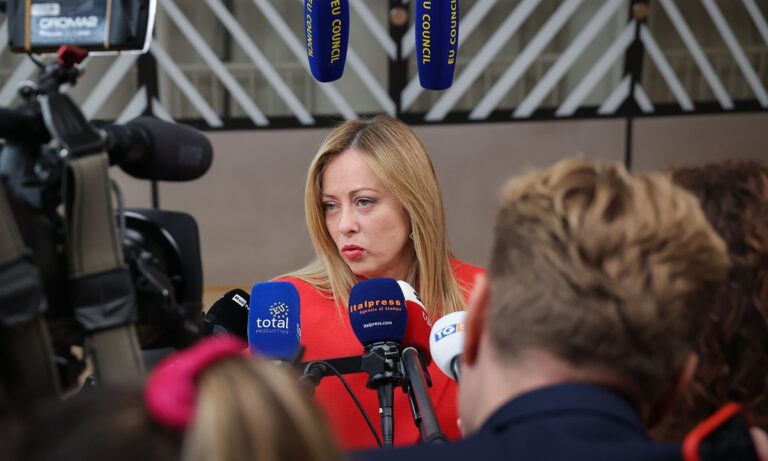
Italian Prime Minister Giorgia Meloni. File photo: VCG
Italian Prime Minister Giorgia Meloni began a five-day visit to China on Saturday. Several business officials and observers from both countries expressed high expectations for the visit, stressing the importance of strengthening bilateral cooperation, especially in areas such as new energy products, new energy vehicles and other green technologies.
This is Meloni’s first visit to China since taking office, and he is the first European leader to visit China after the Third Plenary Session of the 20th Central Committee of the Communist Party of China.
According to China Central Television, Chinese Premier Li Qiang hosted a welcoming ceremony for Meloni at the Great Hall of the People in Beijing on Sunday afternoon, and the two held talks after the ceremony.
The two sides also witnessed the signing of several bilateral cooperation documents covering industry, education and environmental protection.
Experts pointed out that amid the unstable political situation in Europe and the United States, Meloni’s visit will be a good opportunity to bring stability, promote cooperation and resolve differences not only between China and Italy, but also between China and Europe as a whole.
However, experts have warned that after Italy’s withdrawal from the Belt and Road Initiative, the Italian government needs to show sufficient sincerity in cooperation with China and effectively manage differences, especially in negotiating tariffs on Chinese-made electric vehicles (EVs).
Experts said Meloni’s visit was aimed at strengthening cooperation with China and clearing up misunderstandings over Turkey’s withdrawal from the Belt and Road Initiative last year.
Anticipation for the visit
According to Xinhua, Premier Li Keqiang attended the opening ceremony of the 7th China-Italy Entrepreneurs’ Committee meeting together with Premier Meloni on Sunday and called for strengthening economic and trade cooperation between the two countries. Premier Li called on China and Italy to follow the general trend, seize new cooperation opportunities, and deepen mutually beneficial cooperation.
Meloni said Italy and China should strengthen their comprehensive strategic partnership, give full play to their complementary advantages, and boost economic and trade cooperation, according to Xinhua.
Despite not renewing the Belt and Road agreement, Italy has expressed its intention to strengthen cooperation with China and has proposed several alternatives, which Meloni will likely discuss during his visit, said Cui Hongjian, a professor at the School of Regional and Global Governance at Beijing Foreign Studies University.
“We are pleased to take part in the various activities organised during the prime minister’s visit to China, including meetings with senior government officials and local Italian business associations, as well as video conferences with Italian industry organisations to connect Italian companies that have not yet expanded into China,” Massimo Bagnasco, CEO of China Europe Carbon Neutral Technology, told the Global Times on Sunday.
The visit follows several high-level missions from Italy. Just a few weeks ago, Italian Minister of Enterprise and Made in Italy, Adolfo Urso, visited China. Deputy Prime Minister and Minister of Foreign Affairs and International Cooperation, Antonio Tajani, also visited China in September 2023. These visits are evidence of the close ties and deep care that the two countries put into their bilateral relations, Bagnasco noted.
Mr. Bagnasco said he hopes that this visit will identify framework cooperation guidelines in specific areas and establish a roadmap for further implementation by relevant companies. These expectations relate to both investment and trade, and he pointed out that green technology related to climate change is an area where the two countries can have great synergy.
“We are in a very difficult position,” Irene Pivetti, a former speaker of the Italian lower house of parliament, told the Global Times on Sunday. [the visit will see a] The planned resumption of global cooperation, “which will probably develop in further stages, but will essentially boil down to industrial, technological and cultural cooperation,” Pivetti said.
“What is new about this planned global cooperation between China and Italy is that it involves a much more continuous and in-depth dialogue than before, and a mutual study of the common goals to be achieved,” Pivetti noted.
Fan Xianwei, secretary-general of the Italian-Chinese Chamber of Commerce and Industry, said that Prime Minister Meloni’s visit to China will bring new opportunities for Sino-Italian cooperation, which is the common expectation of the two peoples. Chinese companies hope that Prime Minister Meloni’s visit will promote economic globalization and create a good, fair and just business and investment environment.
The industry players also stressed the importance of greater cooperation with China, rejecting the “excess capacity” claims and recent protectionist moves by the EU, including its decision to impose provisional tariffs on Chinese-made EVs.
“The Chinese market is extremely important not only because of its size but also because it serves as a unique testing ground for the latest go-to-market solutions. Italy’s innovative strategies and solutions, combined with the strong development of China’s technology and supply chains, can be mutually beneficial if developed under the right frameworks and fair principles,” Bagnasco said.
Italy has never used such barbaric language as “decoupling” with China, as if other countries should distance themselves from their millennial friends… Italian entrepreneurs, even big ones, want to do business with China if possible, Pivetti noted.
“It is nonsense to accuse China of ‘overcapacity’ when they are using more EVs than they produce domestically,” Pivetti said, adding that tariff policies are considered to have failed when they are used to imbalance competitive markets when talking about the EU’s decision on Chinese-made EVs.
While initial votes by EU member states show Italy is inclined to impose tariffs on Chinese-made EVs, Meloni’s visit could help find a reasonable solution acceptable to both sides. If that happens, it would send an important positive signal to the silent majority in the EU who have yet to vote, Choi said.
While relations between China and the EU have been tense due to issues such as the imposition of tariffs on Chinese-made electric vehicles, Cui pointed out that “Melloni’s visit is expected to also stabilize and promote relations between China and Europe.”
Meloni’s visit to China ahead of the U.S. presidential election is also seen as preparation for a “worst-case scenario” in which the change of U.S. president in November would dramatically change diplomatic and trade relations between the U.S. and Europe.
“Should such an eventuality occur, the EU needs to be better prepared and minimize the losses and impacts,” Cui said. This includes strengthening internal unity to increase resilience against the United States and avoid the “divisive tactics” that former U.S. President Donald Trump may have used during his first term, as well as strengthening cooperation with China.

